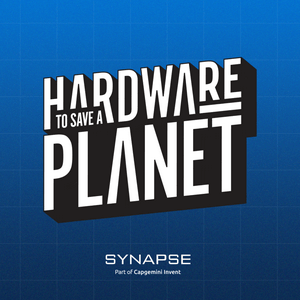97 episódios
- Geothermal energy has long been overlooked, dismissed as a niche despite its ability to deliver constant, carbon-free baseload power. As data centre demand surges and grids strain under electrification, geothermal is re-emerging as a critical piece of the clean energy puzzle. Unlike intermittent renewables, it offers steady generation; if you can find it.
In this episode of Hardware to Save a Planet, host Dylan Garrett speaks with Joel Edwards, CTO and cofounder of Zanskar, about how AI and geoscience are transforming geothermal discovery.
Joel explains why the industry stalled after oil majors exited in the 1980s, and how Zanskar is solving the “needle in a haystack” problem of locating hidden reservoirs. By combining machine learning, proprietary field data, and physics-constrained simulations, the team has reduced exploration costs by up to 90% and drilled one of the most productive pumped geothermal wells in the United States at Lightning Dock. The conversation explores permitting bottlenecks, grid interconnection delays, and Zanskar’s ten-year vision to scale to one gigawatt of reliable and clean power.
Hardware to Save a Planet is brought to you by Synapse. We are a global product development and engineering firm that partners with visionary companies to design, develop, and realize breakthrough hardware and AI-powered innovations that advance climate technologies.
To learn more about Synapse and potential business partnerships we offer outside of the podcast, please visit: https://www.synapse.com/contact/ to get in touch! - Nuclear fusion is rapidly moving from theory to commercial reality. One kilogram of fusion material generates more clean energy than burning 10 million kilograms of coal.
The focus of Anthony Pancotti and his team at Helion Energy is on building the world’s first commercial fusion power plant, targeted to begin delivering electricity by 2028 under a landmark power purchase agreement. Fusion offers the promise of virtually limitless fuel, extraordinary energy density, and clean energy generation without greenhouse gas emissions or long-lasting radioactive waste.
In this episode of Hardware to Save a Planet, host Dylan Garrett speaks with Anthony Pancotti, cofounder and Head of R&D at Helion Energy, about why nuclear fusion is moving from lab experiment to commercial reality. Anthony explains Helion’s radically different, mass-manufacturable approach to fusion, the significance of its Microsoft power purchase agreement targeting 2028, and the remaining engineering, regulatory, and supply-chain challenges. The conversation explores how abundant fusion energy could reshape climate solutions, industry, and humanity’s future.
Hardware to Save a Planet is brought to you by Synapse. We are a global product development and engineering firm that partners with visionary companies to design, develop, and realize breakthrough hardware and AI-powered innovations that advance climate technologies.
To learn more about Synapse and potential business partnerships we offer outside of the podcast, please visit: https://www.synapse.com/contact/ to get in touch! Why Long-Duration Energy Storage Breaks Batteries – and How Hydrogen Fixes It with Mia Rath
22/1/2026 | 52minIn order to meet demand peaks, utilities often have to fire up dirty power plants, essentially generators that burn extra fuel per unit of electricity. So the electricity from those peaker plants is not only the most expensive but also has the highest emissions of any electricity on the grid. But now there’s a solution on the horizon.
In this episode of Hardware to Save a Planet, host Dylan Garrett speaks with Mia Rath, co-founder and CTO of Lumindt, about how solid-state hydrogen storage is transforming commercial energy. They explore how metal hydride batteries decouple power from energy capacity, enabling long-duration, cost-effective storage. Mia explains why this approach outperforms lithium-ion systems, slashes operating costs, and reduces peaker-plant emissions. Listeners will gain insights into scaling hardware innovation, material breakthroughs, and strategies for resilient, on-site renewable energy deployment.
Hardware to Save a Planet is brought to you by Synapse. We are a global product development and engineering firm that partners with visionary companies to design, develop, and realize breakthrough hardware and AI-powered innovations that advance climate technologies.
To learn more about Synapse and potential business partnerships we offer outside of the podcast, please visit: https://www.synapse.com/contact/ to get in touch!The Geothermal Breakthrough: Heating Homes Smarter, Cheaper, and Cleaner with Dan Yates
08/1/2026 | 43minGlobally, we burn as much fossil fuel heating homes as we do driving cars, yet home heating rarely gets climate attention, even though it drives massive energy use, grid strain, and raises household costs.
In this episode of Hardware to Save a Planet, host Dylan Garrett speaks with Dan Yates, CEO and Chairman of Dandelion Energy, about why geothermal heat pumps may be the most overlooked solution in residential decarbonization. Dan explains how tapping the stable temperatures beneath our feet can slash home energy consumption, dramatically reduce peak electricity demand, and outperform air source heat pumps during extreme weather.
He shares how Dandelion cut system costs through builder partnerships, making geothermal viable at scale, and why utilities increasingly see it as a grid-stabilizing asset. The conversation explores how hardware innovation, smart incentives, and new business models can align to make clean, electric home heating both affordable and practical.Powering the AI Era Sustainably: Breakthrough Climate Hardware Tech from 8 Innovators
04/12/2025 | 31minIn this special year-end episode of Hardware to Save a Planet, host Dylan Garrett explores how the rapid expansion of technology and the data centers to support it is accelerating some of the most important climate tech breakthroughs of the decade.
Dylan revisits insights from eight innovators shaping the future of grid capacity, renewable power, long-duration storage, hydrogen backup systems, thermal batteries, and low-carbon construction materials.
As AI’s energy demands surge, these technologies are proving essential for building resilient, sustainable infrastructure. This recap highlights the hardware, economics, and engineering advances that will define how AI and data centers can scale, without overwhelming the planet.
Mais podcasts de Notícias
Podcasts em tendência em Notícias
Sobre Hardware to Save a Planet
Our planet is warming at an unsustainable rate. This climate crisis is being caused by humans and it will take human ingenuity to stop or reverse it... Hardware to Save a Planet explores the technical innovations that are giving us hope in the fight against climate change. Each episode focuses on a specific climate challenge and explores an emerging physical technology solution, with the person bringing it into reality. Hosted by Dylan Garrett, President at Synapse.
Site de podcastOuça Hardware to Save a Planet, Calma Urgente e muitos outros podcasts de todo o mundo com o aplicativo o radio.net

Obtenha o aplicativo gratuito radio.net
- Guardar rádios e podcasts favoritos
- Transmissão via Wi-Fi ou Bluetooth
- Carplay & Android Audo compatìvel
- E ainda mais funções
Obtenha o aplicativo gratuito radio.net
- Guardar rádios e podcasts favoritos
- Transmissão via Wi-Fi ou Bluetooth
- Carplay & Android Audo compatìvel
- E ainda mais funções


Hardware to Save a Planet
Leia o código,
baixe o aplicativo,
ouça.
baixe o aplicativo,
ouça.








































